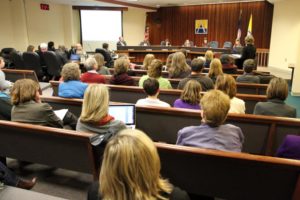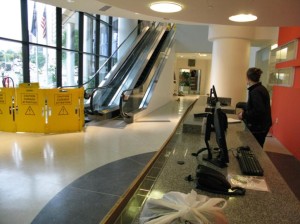 (Updated at 8:35 p.m.) The Arlington School Board will present its proposed budget to the Arlington County Board tonight. The joint meeting comes as the School Board has requested an additional $3.1 million in tax funding from the County Board.
(Updated at 8:35 p.m.) The Arlington School Board will present its proposed budget to the Arlington County Board tonight. The joint meeting comes as the School Board has requested an additional $3.1 million in tax funding from the County Board.
The School Board’s proposed budget calls for $524.5 million in expenditures, roughly $4 million more than Superintendent Dr. Patrick Murphy’s proposed budget. The board’s budget keeps most elements of Murphy’s budget in tact — including merit-based pay raises for teachers, no increase in class sizes and funding to buy more school buses — but scales back some proposed cuts.
Cuts to teen parenting staffing, elementary reading teachers, high school gifted teachers, Standards of Learning teachers and minor construction/major maintenance have been reduced collectively by $2.3 million. The budget also adds a $600,000 reserve, and $1.1 million to account for an increase in projected school enrollment.
 Murphy’s budget expected enrollment to increase from 22,613 students this school year to 23,586 students for the 2013-2014 school year. The latest spring projection puts 23,725 students in Arlington classrooms for the next school year.
Murphy’s budget expected enrollment to increase from 22,613 students this school year to 23,586 students for the 2013-2014 school year. The latest spring projection puts 23,725 students in Arlington classrooms for the next school year.
All told, the increase in enrollment will require $11.1 million for additional staffing, materials, furniture and relocatable classrooms, according to the School Board’s budget presentation, set to be delivered tonight. The new trailer classrooms alone will cost $2 million.
The School Board is asking the County Board for a dedicated 0.5 cent real estate tax increase to help pay for the reduction in cuts and the added enrollment. The tax hike would be expected to bring in an additional $3.1 million. The rest of the $4 million is expected to come from one-time funding and additional state funding.
Arlington Public Schools are expected to face additional budget pressures in the next several years, as enrollment continues to grow and as new schools and school additions are built. An addition to Ashlawn Elementary is expected to be complete in time for the 2014-2105 school year, while a new elementary school on the Williamsburg Middle School campus is expected to be complete in time for 2015-2016.
Those new additions and schools will come with additional administrative and operational costs. This comes at a time of weakness for property values in Arlington — the main driver of revenue for the county and the school system. During a meeting with reporters in February, Dr. Murphy said future budgets “could be challenging.”
While teachers for the new Williamsburg elementary will be largely pulled from overcapacity schools, administrative and materials costs for the school are slated to be included in next year’s budget process.
“If all things stay the same, we’re very concerned for FY 2015,” Murphy said.
The joint School Board/County Board work session will take place at 7:00 p.m. tonight (April 9) in rooms 101/103/105 of the Syphax/Sequoia building at 2110 Washington Blvd. The public is encouraged to attend.
Residents will get a chance to weigh in on the School Board’s budget at a public hearing on Thursday, April 18.










